Main Findings
- 55% of children are dependent on the Internet, according to our specific calculation.
- As kids get older, their dependency on the Internet has a negative effect on their behaviour at school, their ability to make friends, their intelligence, and relationships with their parents, according to their own evaluation.
- Internet dependent kids more likely have disputes with parents about Internet usage (30% compared to just 10% of those who are non-dependent).
- The impact of Internet usage goes even further with half (50%) of Internet dependent kids admitting that they communicate with their parents less as a result of using their connected devices (compared to just a quarter of non-Internet dependent children).
- Over half (56%) of Internet dependent children conceal their potentially risky online activities from their parents, compared to 28% of non-Internet dependent kids.
- 25% of children dependent on the Internet attempt to avoid parental controls, comparing with 8% of non-dependent children.
- Internet-dependent children are more likely to share sensitive information on social media, such as their home address (36%) and parents’ earnings (26%) compared with 25% and 16% respectively for non-Internet dependent children.
- Almost a third of those who are dependent (28%) admit that they use content that is not appropriate for kids, whereas only one-in-ten non-dependent kids admit the same.
- Dependent children face cyberthreats more often than non-dependent children (48% vs. 24%). Worryingly, they are more likely to become victims of bullying not only online, but also offline (17% vs. 6%).
- One of the impacts of children’s Internet-dependency is the Internet-dependency of their parents. Thus, 62% of the dependent parents surveyed had dependent children. This compares to only 32% among the non-dependent parents surveyed.
Methodology
The research, undertaken for Kaspersky Lab by iconkids & youth, comprised an online survey of 3,780 families with children aged 8 to 16 (one parent and one child per family) in seven countries:
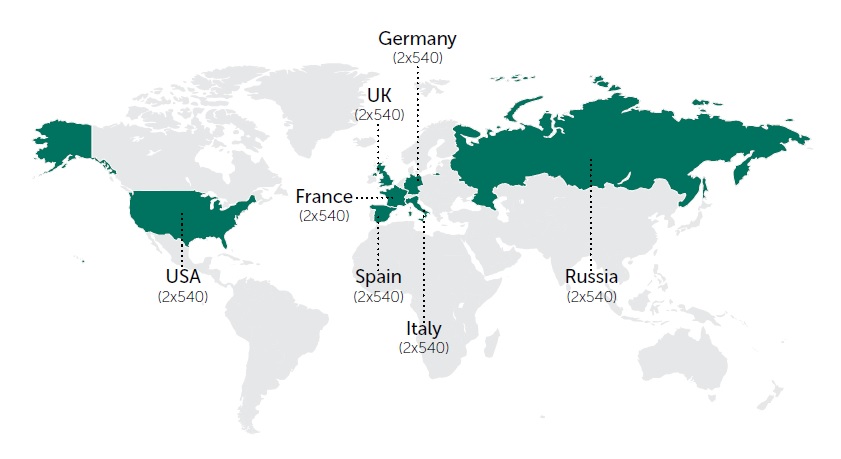
The sample in every country included 540 families split into 9 categories according to the age of the child in the family (60 families with children 8 y.o., 60 with children 9 y.o. (boys and girls equally) etc. In the families with several children the child for the survey was chosen randomly).
Not all the survey results have been included in this report. To request further data please contact Kaspersky Lab at prhq@kaspersky.com.
The online generation
The Internet, for children and adults alike, is a hugely important medium. Children and young people now frequently use it to learn, communicate, interact, innovate and play. However, can you have too much of a good thing?
This study found that overuse and dependency on the Internet is a very real problem among children. Kids who once lived for activities with friends or watching TV are finding themselves increasingly dependent on the Internet, trapped in a mindset that places the digital world above real life.
Being dependent on the Internet brings risky behaviour and as kids spend more time online they are faced with more cyberthreats and an increased chance of viewing inappropriate content. This trend is also affecting children’s social skills and wellbeing, as they immerse themselves in the online world, to the detriment of their offline behaviour. It places a strain on modern family relationships and puts kids at risk, making it vital that parents set a good example and take control of their children’s Internet usage from an early age to minimise the damage.
Measuring dependency
Dependence on an activity can be something that´s pleasurable, but with continued use it becomes compulsive and can interfere with ordinary life responsibilities, such as work, relationships, or health. Users may not be aware that their behaviour is out of control or causing problems for themselves and others – especially when they are children.
In attempting to assess whether someone is dependent on using the Internet, we focussed on those children who said they are addicted to Internet use (19%), plus the number of kids whose parents said their children are addicted (27%). We also added to this the number of kids who use the Internet almost constantly (22%) according to their own admission, because even though they might not think they have a dependency, their patterns of use tell us otherwise.
As a result, we found that 55% of kids aged 8 to 16 are dependent on the Internet, and this figure rises with children getting older.
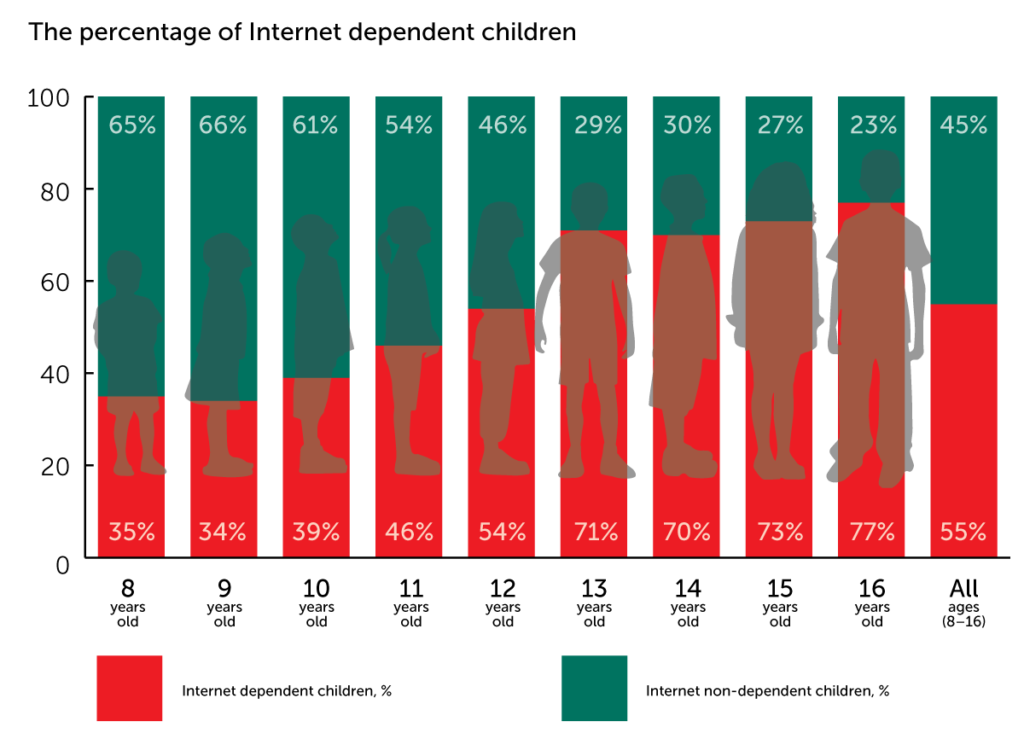
This figure is in line with a number of recent studies in various countries around the world. For example, in the UK the communications industry regulator Ofcom found that 59% of Internet users are “hooked,” spending more than 24 hours online every week.
This report paints a worrying picture of the dangers facing young people growing up online. We will compare how dependent and non-Internet dependent kids feel their Internet use is affecting them. We will look at children’s risky behaviour, the effect of the Internet on family relationships and what type of dangers children are confronted with, before recommending advice for parents on safe Internet use.
Signs of impact
To find out the effects of prolonged Internet usage among children, we asked kids how they felt about key aspects of their daily lives by a scale from 1 to 10 points where 1 is the worst and 10 is the best. The results showed a worrying pattern as dependent children get older.
When asked about how good they feel at school, those we identified as dependent on the Internet at earlier ages gave themselves a higher score than non-dependent kids (up to 8.5 among dependent 9-year-olds compared with 8.2). However, as this group of children get older the score for being good at school drops and gets lower than the score for non-dependent kids (up to 7.5 vs. 7.9 for children aged 15).
When it comes to feeling smart, Internet dependent children aged 9 gave themselves a score of 8.4, which is higher than those classed as non-dependent who gave a score of 8.1. However, as both sets of children age, they feel their intelligence reduces at the same scale to 7.9 among children aged 15.
Making new friends is also given a higher score by Internet dependent children aged 9 (7.8 compared to 7.4). The older age groups show more contrast in their ability to make friends: Internet dependent 16 year olds only give themselves a score of 7 with non-dependent kids of this age scoring 7.7.
But it is children’s relationships with their parents which shows a marked contrast between dependent and non-dependent children at different ages. For children not dependent on the Internet the level stays relatively flat, averaging at 8.6 compared to 8.2 for dependent children. However, with the age the gap becomes even much bigger – with dependent 16-year-olds measuring their relationships with parents at 7.9 compared with 8.7 for non-dependent kids.
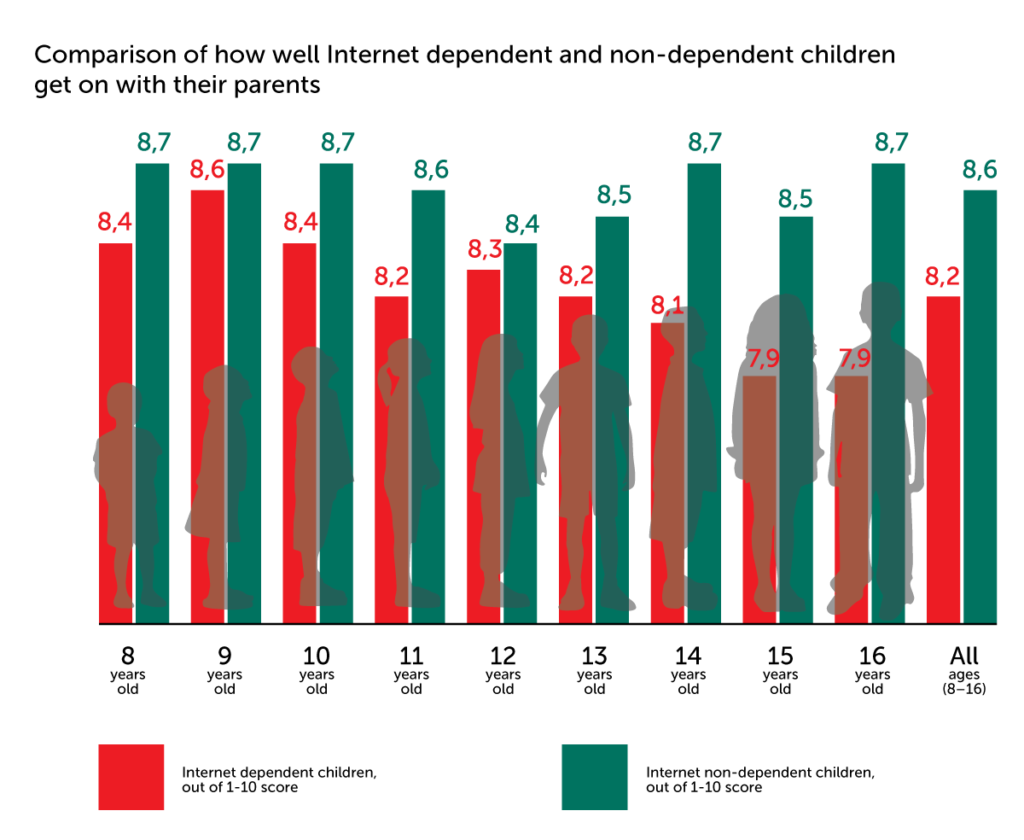
Risky behaviours
Children and young people face a broad spectrum of risks when they use a computer but our study has found that kids who are dependent on the Internet also exhibit the riskiest behaviours in terms of their online activity.
We found that over a quarter (28%) of the kids we categorised as dependent freely admit that they use content that is not appropriate for children, but only one in ten (11%) non-dependent kids admit the same.
This can pose hazards for anyone surfing the Internet, but especially for children. For example, an 8-year-old might do an online search for “Lego”. But with just one missed keystroke, the word “Legs” is entered instead, and the child may be directed to a slew of websites with a focus on legs – some of which may contain pornographic material. Cartoons are another example of a search term that can easily direct to content that is not suitable for minors.
It is also logical that Internet dependent kids face more cyberthreats because they are online more often, but also because they undertake more risky activities. Almost half (48%) of those children dependent on the Internet recognise they have encountered a cyber threat, but only 24% of non-dependent children say the same. This finding is fairly constant across all the young ages we surveyed.
The most common threats faced are data loss due to viruses (11%), pornographic content (10%), password theft and account hacking (10%). Dependent children also become cyberbullying victims more often (7% vs. 1%). Worryingly, these kids are also three times more likely to experience bullying in the real world (17%) as opposed to non-dependent children (6%).
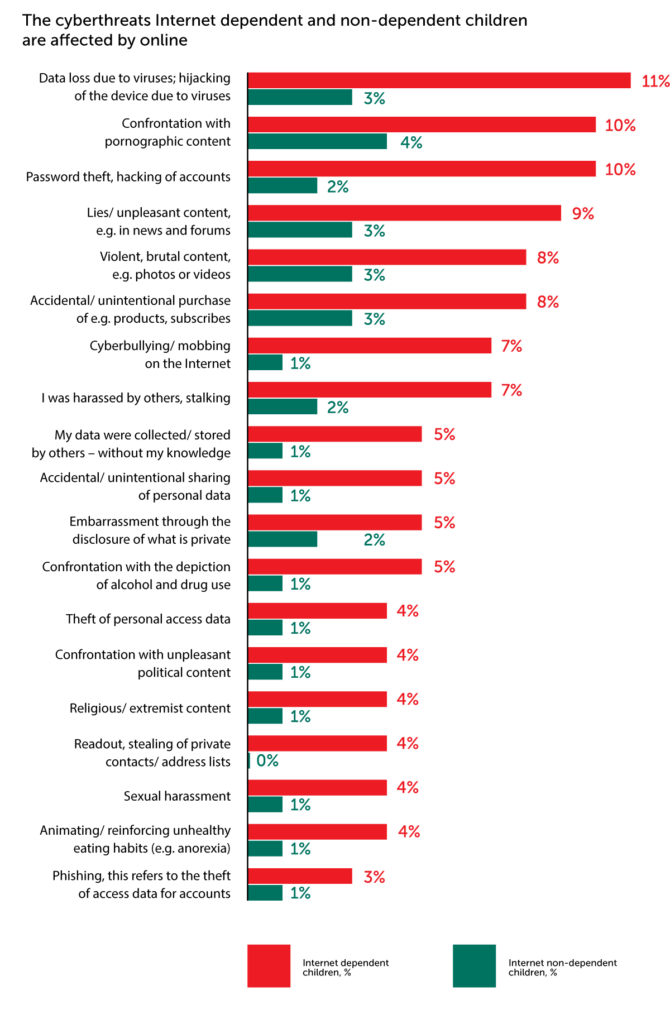
One of the main parental concerns about children using the Internet is the sharing of sensitive information. Over a third (36%) of Internet dependent kids share information about their home address online, compared to just a quarter (25%) of non-Internet dependent children.
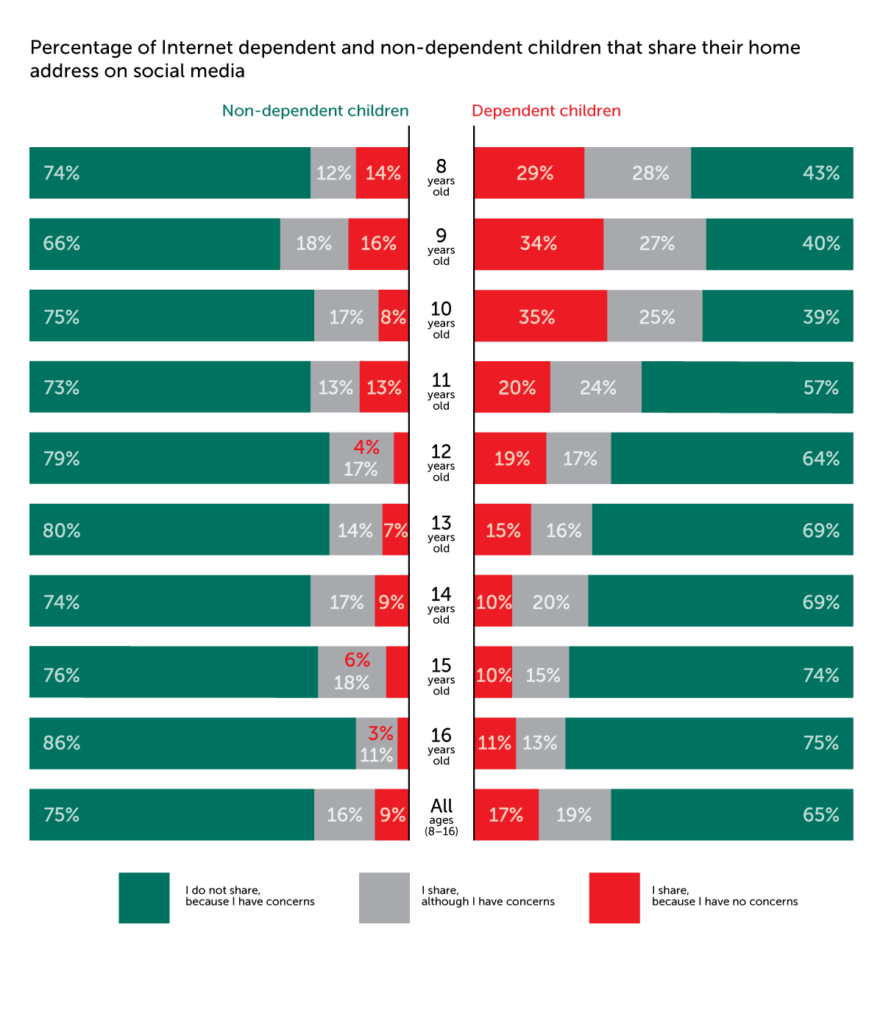
We also found that 71% of Internet dependent kids share information about the school they attend, compared to 57% of other children. Children dependent on the Internet are also freely sharing information about the places they visit (60%), where their parents work (36%), and how much their parents earn (26%) comparing with much lower figures among non-addicted children (40%, 26% and 16% accordingly).
Overall, it is the younger age groups who are most guilty of sharing potentially valuable and exploitable information online, making it all the more important for parents to educate and control their children’s Internet usage from an early age.
Moreover, over half (56%) of Internet dependent children conceal their potentially risky online activities from their parents, compared to 28% of other kids.
Impact on the family
One of the great debates about the Internet is the affect it has on family relationships. On the one hand, many praise the Internet’s abilities to extend and build relationships because we can contact people across the ocean at the click of a mouse. If, for example, a parent is away on business they can easily keep in touch on video chat with kids back at home. On the other hand, there are concerns that the Internet sucks people away from direct contact with people, fostering alienation and real-world disconnection.
The impact of Internet technologies on modern family relationships cannot be underestimated but it appears that dependence on the Internet is creating a number of problems. We found that overall a third (30%) of kids who are dependent on the Internet have disputes with parents about online Internet usage, compared to just 10% of non-dependent children.
It’s interesting to note that these disputes occur more often amongst younger age groups, with the figure rising to 43% of 9 year olds.
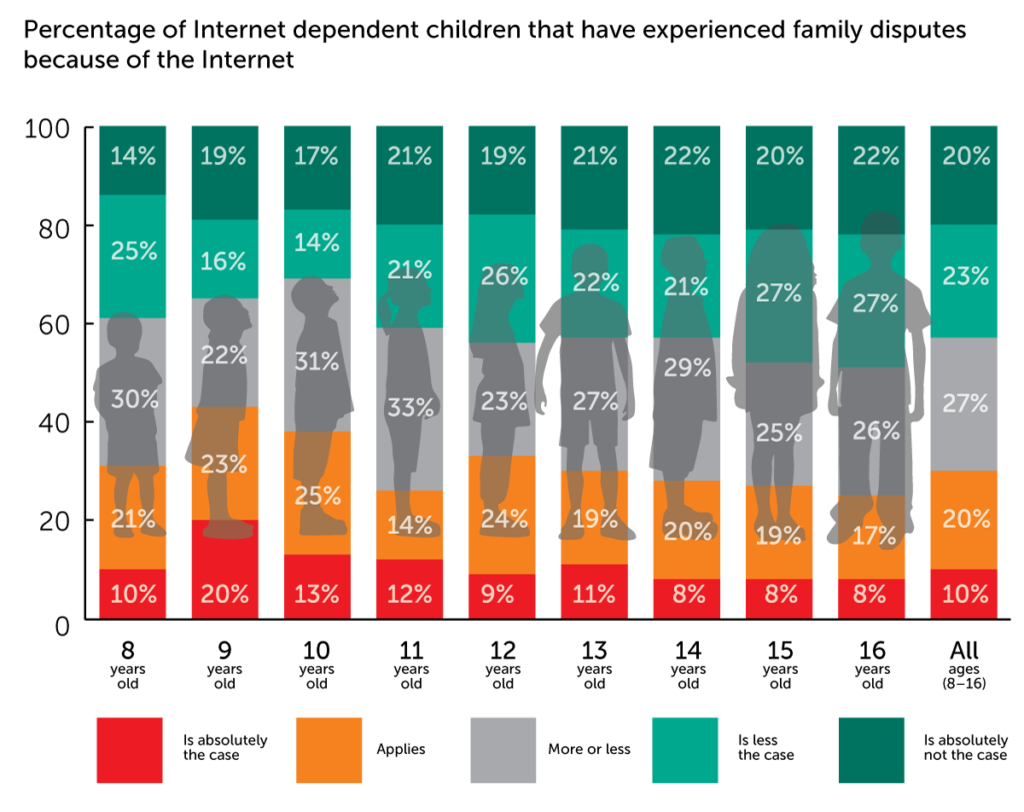
It appears that Internet use is also making children withdraw from their parents to a certain extent, with half (50%) of Internet dependent children admitting that they communicate less with their parents now as a result of their connected device usage, while only 25% on non-dependent kids do. A third of those who are dependent (32%) also admit that they’ve seen something on the Internet which they don’t want to talk to their parents about, whereas only one-in-ten non-dependent kids admit the same.
Parental impact
As well as the impact that Internet dependency is having on children’s ability to communicate with their parents, grown-ups own usage and steps taken to protect their children is also part of the problem and cause for concern.
The research found that Internet dependent children are more likely to have Internet dependent parents. Indeed, 62% of the parents surveyed, who qualified as dependent, had dependent children. This compares to only 32% among the non-dependent parents surveyed.
Online threats facing Internet dependent children are also increased due to weaker parental controls. Almost a third (29%) of parents of Internet dependent children have no parental control software on their computers. They are more free to surf the web and access any content easily, compared with 38% of non-dependent children.
However, despite some parents putting controls in place to safeguard their children and monitor their usage, 25% of Internet dependent children attempted to avoid parental controls, compared with 8% of non-dependent children.
When we asked children themselves which methods they consider effective to safeguard them when on the Internet, the responses were extremely enlightening. Only 53% of Internet dependent children thought password protecting specific websites was an effective solution with 74% feeling antivirus protection was an effective method. Time limits set by parents were only considered effective by half (50%) of Internet dependent kids and three quarters (72%) felt that talking with parents about the dangers was a good way to keep them safe online.
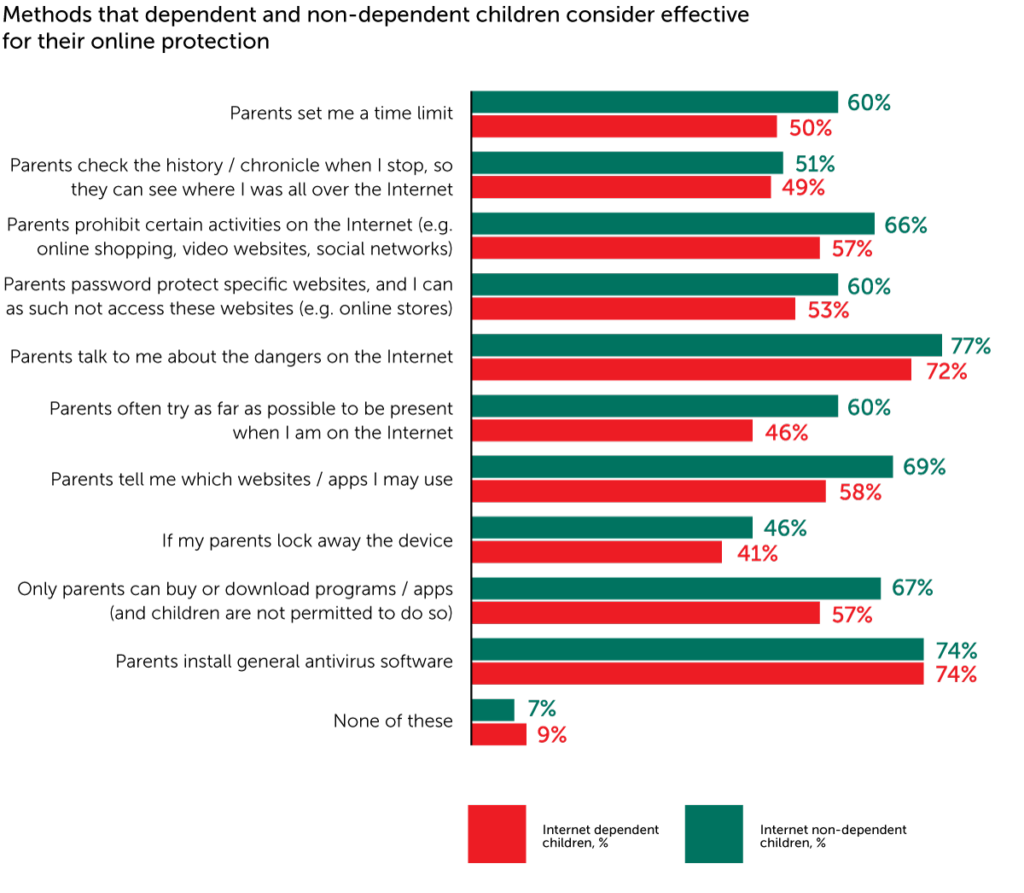
Conclusion
The Internet provides children with a world of opportunity but, as this report shows, we need to be careful about the dangers of online dependence and effectively control kids Internet usage from an early age.
We have found a clear difference between Internet dependent and non-Internet dependent children when it comes to the level of threats they face, the impact of their activities on family relationships, and the extent to which they are likely to exhibit risky behaviour.
To help parents protect their children online from day one, we recommend taking the following steps:
- Set a good example to your kids by not overusing the Internet yourselves.
- Stay involved with your children’s online activities and teach them to use technology responsibly.
- Place constraints on how much they use their connected devices. Set a timer – most family Internet management tools have one – so that children don’t stay on a device for too long.
- Encourage your child to play outside, develop a hobby or pick up a book and read. Don’t place digital devices in your child’s bedroom as it could be a cause of distraction.
- Teach children to never post identifying information (phone numbers, address, school, age), revealing photos or videos, or sexual messages online; and to never reveal passwords to anyone.
- Befriend your child online until you are satisfied that she or he is ready to take responsibility for their online behaviour.
- Use special parental control software to put restrictions on the device, so that your children cannot access inappropriate websites (i.e. gambling, pornography, violent video games, or movies) or apps.
- Most important of all, talk. Communicating about the things your child sees on the Internet is important because it will help them to learn how to access the digital world responsibly and put the real world into context.
 Kids Safety
Kids Safety





